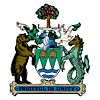Kelowna
| City of Kelowna | |||
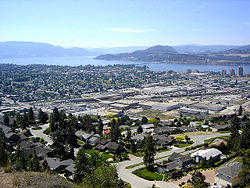 |
|||
|
|||
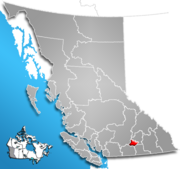 |
|||
| Country | |||
|---|---|---|---|
| Province | |||
| Regional District | Central Okanagan | ||
| Settled | 1879 | ||
| Incorporated | 1905 | ||
| Government | |||
| - Mayor | Sharon Shepherd | ||
| - Governing Body | Kelowna City Council | ||
| - MP | Ron Cannan | ||
| - MLAs | Sindi Hawkins Al Horning |
||
| Area | |||
| - City | 211.69 km² (81.7 sq mi) | ||
| Elevation | 344 m (1,129 ft) | ||
| Population (2006) | |||
| - City | 106,707 | ||
| - Density | 504.1/km² (1,305.6/sq mi) | ||
| - Metro | 162,276 | ||
| - Metro Density | 55.9/km² (144.8/sq mi) | ||
| Time zone | Pacific Time Zone (UTC-8) | ||
| - Summer (DST) | Pacific Daylight Time (UTC-7) | ||
| Postal code span | V1P, V1V - V1Z | ||
| Area code(s) | +1-250 - 778 | ||
| Website: City of Kelowna | |||
Kelowna (2007 population 106,707, metropolitan population of 165,596) is a city on Okanagan Lake in the Okanagan Valley of British Columbia, Canada. Its name derives from a native term for "female grizzly bear." Kelowna ranks as the 22nd largest metropolitan area in Canada.
Nearby communities include Westside to the west across the lake, Lake Country and then Vernon to the north, Westbank and then Peachland to the southwest and further to the south, Summerland and Penticton.
Contents |
History

French Roman Catholic missionaries arriving in 1859 were the first Europeans to settle at Kelowna, a place they dubbed "L'anse au sable" (Bay of Sand) in reference to the sandy shoreline. Kelowna was officially incorporated in 1905.
Economy
The service industry employs the most people in Kelowna, the largest city in the tourist-oriented Okanagan Valley. In summer, boating, golf, hiking and biking are popular, and in winter, both Alpine skiing and Nordic skiing are favorite activities at the nearby Big White Ski Resort and Silver Star Ski Resort.
Kelowna produces wines that have a worldwide reputation. Vineyards are common around and south of the city where the climate is ideal for the many wineries. Notable ones include the Mission Hill Estate Winery, specifically for its unique architectural design. However, at least two major wineries were damaged or destroyed in 2003 due to the Okanagan Mountain Park Fire. Kelowna is also the home of Sun-Rype, a popular manufacturer of fruit juice and snacks.
With roots dating back to 1965, Okanagan College is the predominant centre for vocational and undergraduate post-secondary education in Kelowna. With over 5000 full-time students it constitutes the largest college in British Columbia outside the Lower Mainland and Victoria. The University of British Columbia took over the North Kelowna campus of Okanagan University College (now Okanagan College) on July 1, 2005. While UBCO continues to offer many of OUC's undergraduate programs, UBC Okanagan also offers Engineering and Management undergraduate programs and has developed Graduate programs in most disciplines.
Kelowna is the seat of the Regional District of the Central Okanagan, the third-largest metropolitan area in British Columbia (after Vancouver and Victoria), and the largest in the British Columbia Interior. With scenic lake vistas and a dry, mild climate, Kelowna has become one of the fastest growing cities in North America. The appropriate management of such rapid development (and its attendant consequences) is a source of significant debate within the community. Kelowna is the second most expensive housing market in Canada (behind Vancouver).[1] Also, Kelowna is the least affordable housing market in Canada and 13th in the world. It is classified as "Severely Unaffordable".[2] Because of the Okanagan's climate and vineyard-filled scenery, it has been compared to California.
Prominent citizens
Kelowna was home to the late Premier of British Columbia, W.A.C. Bennett and is the birthplace of his son, William R. Bennett, who also served as Premier of the province.
Former Major League Baseball players, Jeff Zimmerman of the Texas Rangers, his brother Jordan Zimmerman, and Paul Spoljaric were born here. The city is also home to The Grapes of Wrath, one of Canada's most popular rock bands in the 1980s and early 1990s. The 2007 World Women's Curling Championship winning Kelly Scott rink is based in Kelowna. Evangeline Lilly of the hit TV show Lost was discovered on the streets of Kelowna. Many National Hockey League players also reside in Kelowna, including Dany Heatley, Wade Redden, Trevor Linden, Jarome Iginla, Josh Gorges, Blake Comeau, Shea Weber. Rock singer Paul Rodgers also calls Kelowna home.
Demographics
According to the Statistics Canada 2001 census[3], the population estimates there were 96,288 people residing in Kelowna and 147,739 people residing in the Greater Kelowna Area. 48.4% of residents were male and 51.6% were female. Children under five accounted for approximately 4.8% of the resident population of Kelowna. This compares with 5.2% in British Columbia, and 5.6% for Canada overall.
In mid-2001, 18.4% of the resident population in Kelowna were of retirement age (65 and over for males and females) compared with 13.2% in Canada, therefore, the average age is 41.1 years of age comparing to 37.6 years of age for all of Canada.
In the five years between 1996 and 2001, the population of Kelowna grew by 8.2%, compared with an increase of 4.9% for British Columbia as a whole. Population density of Kelowna averaged 50.9 people per square kilometre, compared with an average of 4.2, for British Columbia altogether.
|
Population Growth
Religious groups
|
Ethnic origin
|
Travel
Roads and highways
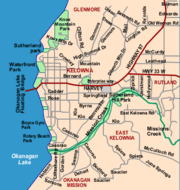
For years, only one major highway passed through the city of Kelowna: Highway 97. The road itself is good, but its connections to all points east and west in the province were only managed by using the slow, curving Trans Canada Highway and the Crowsnest Highway.
As the Okanagan Valley is a popular getaway for residents in Vancouver, a new freeway was built into the BC interior in 1986, eliminating over two hours of travel time between the two major destinations. This freeway, starting in Hope, is known as the Coquihalla Highway (Hwy 5), and terminates in Kamloops. This new freeway system allows one to drive the 425 kilometres from Vancouver to Kelowna in just under four hours.
A spur route, The Okanagan Connector, or Hwy 97C, was later added in 1989; it connects in Merritt, and heads eastward to Peachland, about twenty minutes south of Kelowna.
Kelowna is connected to Westside by the new five lane William R. Bennett bridge which officially opened May 25, 2008. This new bridge now links Highway 97 to the southern Okanagan and the Coquihala connector. The old floating bridge is currently being dismantled as it has outlived its usefulness and is incapable of supporting the current traffic levels. The new William R. Bennett bridge has helped to alleviate some traffic congestion but ongoing roadwork on interchanges, the restructuring of traffic lights and other improvements are underway on HWY 97 on both the Kelowna East and Westside West of the bridge. This stretch of Highway 97 continues to be one of the province's busiest traffic arteries and improvements will be necessary to keep up with the ever increasing population and the ever expanding tourist traffic to this area.
Highway 33, which connects with Highway 97 in Rutland, provides an alternate way to enter and exit the city, towards the southeast.
Air travel
Kelowna International Airport, north of the downtown core, has regular flights to and from Calgary, Edmonton, Toronto, Vancouver, Victoria, Las Vegas, Honolulu and Seattle, as well as seasonal service to Mexico.
Climate
Relative to most Canadian cities, Kelowna enjoys a dry climate and mild temperatures (Mean Annual Temperature = 7.7 °C (45.9 °F), January Mean Temperature = −3.8 °C (25.2 °F); Mean July Temperature = 19.1 °C (66.4 °F)) but this is recorded at the Kelowna Airport, inland and at a higher altitude than the city core. Okanagan Lake tends to moderate the winter climate, but Arctic air occasionally penetrates into the valley during winter (coldest recorded temperature = −36.1 °C (−33.0 °F), 30 December 1968). Summers are hot and sunny, with daytime temperatures often exceeding 35 °C (95.0 °F) (hottest recorded temperature = 39.5 °C (103.1 °F), 24 July 1994). Nighttime temperatures in summer are cool due to the dry environment. The city averages about 300 millimetres (12 in) of precipitation per year, with about 1/3 of the precipitation falling as snow, the bulk in December and January.
Although Kelowna averages 300.5 hours of bright sunshine in July (61% of daylight hours), the early winter months are mostly overcast; thus, Kelowna averages only 40.3 hours of bright sunshine in January (for comparison, consider 120 hours at Winnipeg, Manitoba and Miramichi, New Brunswick; 44 hours at Prince Rupert, British Columbia; 45 hours at Yellowknife, Northwest Territories).
(All data are derived from Environment Canada statistics for the Kelowna airport)
Kelowna is the least windy city in Canada with 39% of wind observations recorded as calm [4][5][6][7][8].
Venues and attractions

- Prospera Place, a 6,800-seat arena
- Apple Bowl, a 5,700 seat outdoor stadium
- Alternator Gallery for Contemporary Art[9]
- Rotary Centre for the Arts, a 326-seat theater[10]
- Kelowna Art Gallery[11]
- Kelowna Community Theatre, a 853-seat theater[12]
- Kelowna Museum[13]
- Kelowna Marina on Okanagan Lake
- Capital News Centre
- Kelowna Farmers Market - April to October Outdoors
- Kasugai Gardens, an outdoor Garden beside City Hall built to celebrate friendship with its sister city; Kasugai, Japan. [14]
- Summerhill Pyramid Winery
- Kettle Valley Railway (Myra Canyon Trestles)
- Knox Mountain Hillclimb - One of the worlds longest uphill point to point car races still running. The event runs May long weekend of each year.
Gallery
Sport
- Kelowna Rockets - Western Hockey League (Winners of the 2004 Memorial Cup)
- Okanagan Sun - Canadian Junior Football League (Winners of the 1988 and 2000 Canadian Bowl)
- Okanagan Challenge - Pacific Coast Soccer League
- Kelowna Falcons - West Coast Collegiate Baseball League
- Kelowna Wilderness - Outdoor Basketball Association
Media
Local services
- Kelowna Weather
- The Okanagan Regional Library has 3 branches in Kelowna
- Emergency services are provided by the Kelowna General Hospital, the BC Ambulance Service, the Kelowna Fire Department,
Central Okanagan Search and Rescueand the Royal Canadian Mounted Police - Kelowna Regional Transit System provides transit to the Kelowna Area (A branch of BC Transit)
Education
|
Public schools[15] Public schools in the Kelowna area are part of School District 23 Central Okanagan or School District 93 Conseil scolaire francophone:
|
Private schools[16]
|
Post-secondary[17]
|
Events of significance
- On August 6, 1969, a sonic boom from a nearby air show produced an expensive broken glass bill while at least 6 people were injured[18].
- Winter 1983 was the last time that the Lake completely froze over. (A Royal Canadian Mounted Police helicopter successfully 'rescued' an SUV that had tried to drive across the Lake and cracked through the ice).
- In both 1986 and 1988, alcohol-fuelled riots erupted during summer Regatta festivities.
- On May 7, 1992, a forest fire consumed 60 hectares of forest on Mount Boucherie in West Kelowna; no homes were damaged.
- In August 2003, a nearby wildfire destroyed over 200 homes and forced the temporary evacuation of approximately 30,000 residents[19].
- During the 2003 fire, many trestles of the historic Kettle Valley Railway were destroyed. One of the trestles, Trestle 18, has been rebuilt, and other trestles are planned to be reconstructed as well.
- In May 2005, Kelowna celebrated its Centennial.
- In 2005, a new bridge to replace the Okanagan Lake Bridge began construction, being part of a plan to try and alleviate the severe traffic problems experienced during the summer months when people from Kelowna drive to Westbank and vice versa. (the height of tourist season).
- In July 2007, rowdiness during the "Wakefest" festival led city council to cancel any future Wakefest events due to the public drunkenness exhibited by many young attendees. A March 2008 proposal to host the event in nearby Penticton was declined by that city's council, due to the demands it would have placed on the local police.
Sister cities
Kelowna has "sister city" agreements with the following cities:[20]
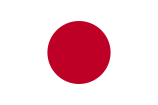 Kasugai, Japan
Kasugai, Japan Senenga, Zambia
Senenga, Zambia Veendam, Netherlands
Veendam, Netherlands
Trivia
- In the science fiction television series Stargate SG-1, Jonas Quinn hails from the nation of Kelowna on the planet Langara. Stargate SG-1 and its sister show Stargate Atlantis are produced in Vancouver.
- Some believe a lake monster named Ogopogo lives in Lake Okanagan. In the past, naysayers have pointed out the similarities between the so-called monster and a beaver, a log, and other less monstrous lake denizens.
- The Online Virtual World Club Penguin has its headquarters located in Kelowna.
- In the song "Driving One of Your Cars" by Swedish musician Lisa Miskovsky, she mentions Kelowna in the lyrics "Kelowna is beautiful in summertime they say".
- Fido, the comedy/horror/thriller movie about zombies, was shot in Kelowna and debuted on September 7, 2006 at the Toronto Film Festival.
- Part of the movie Mee Shee: The Water Giant was filmed here.
References
- ↑ CBC.ca: Kelowna house prices move ahead of Calgary, Toronto
- ↑ 4th Annual Demographia International Housing Affordability Survey
- ↑ 3.0 3.1 Kelowna Community Profile - Statistics Canada. 2002. 2001 Community Profiles. Released June 27, 2002. Last modified: 2005-11-30. Statistics Canada Catalogue no. 93F0053XIE.
- ↑ Phillips, D. 1990. The Climate of Canada. Catalogue No. En56-1/1990E. Ottawa: Minister of Supply and Services of Canada
- ↑ Atlas of Canada http://atlas.nrcan.gc.ca/site/english/learningresources/facts/superweather.html
- ↑ Canada - A peoples' history, http://www.omnitv.ca/ontario/tv/history/interactive/climatefacts.shtml
- ↑ US Green Building Council, Kelowna, British Columbia Competition Program Detailed Summary, https://www.usgbc.org/FileHandling/show_general_file.asp?DocumentID=1264
- ↑ Weather - CanadianStudy.ca
- ↑ Alternator Gallery for Contemporary Art
- ↑ Rotary Centre for the Arts
- ↑ Kelowna Art Gallery
- ↑ Kelowna Community Theatre
- ↑ Kelowna Museum
- ↑ JGarden - Gardens
- ↑ Public Schools in Kelowna: Kelowna Senior Secondary, Rutland Senior Secondary, Mount Boucherie SecondaryOkanagan Mission Secondary, KLO Middle, Dr. Knox Middle, Constable Neil Bruce Middle, Rutland Middle, Springvalley Middle
- ↑ Private Schools in Kelowna: Aberdeen Hall Preparatory School,Kelowna Christian School, Heritage Christian School, Vedanta Academy, Okanagan Adventist Academy, Immaculata Regional High School, St. Joseph Elementary, Kelowna Waldorf School, Okanagan Montessori School, Okanagan Montessori
- ↑ Post-secondary Schools in Kelowna: UBC Okanagan, Okanagan College, Sprott-Shaw Community College
- ↑ sonic boom
- ↑ Okanagan Mountain Park Fire 2003
- ↑ "Sister Cities". City of Kelowna. Retrieved on 2007-09-26.
External links
- Kelowna City Hall
- CHBC TV News Website
- CKOV 63
- Regional District of the Central Okanagan
- School Board
- University of BC - Okanagan
- Kelowna Art Gallery
- Circle The Earth Kelowna Page
 |
Vernon |
|
|||||
| Westside | |||||||
| Penticton |
|
|||||
|
||||||||||||||

